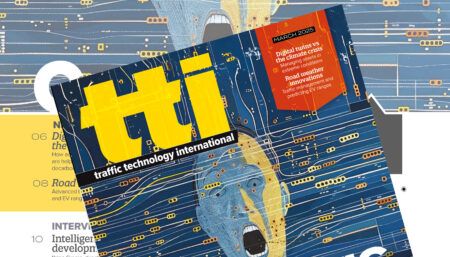The UK’s Intelligent Transport Systems trade association, ITS (UK) is drawing up a series of case studies, fact sheets and blog posts explaining the benefits of using technology to deliver safer, greener and more efficient mobility.
The campaign follows a series of criticisms of some aspects of technology use, often around smart motorways, which it is feared are beginning to undermine the whole value proposition for ITS, which is the use of computers, communications, positioning and automation technologies to improve the safety, management and efficiency of transport.

“There is no doubt that a road that uses technology to provide greater situational awareness, identify anomalies and optimise traffic flow will be safer and more efficient than a dumb road with no technology”, explains ITS (UK) chair Ryan Hood of TRL. “Sadly, frequent negative stories in the press have begun to leak into a questioning of all technology, and that is something we as an industry association must counter.”
Hood points out that ITS has contributed hugely to improving transport in the UK. “Think about better traffic management through the real-time intelligent phasing of traffic lights which minimises congestion and reduces harmful emissions – things we all benefit from. Reliable, fair enforcement using the latest average and fixed traffic cameras help to maintain safe speeds, reducing the numbers of people killed or seriously injured on our roads,” he says. “Our advanced transport modelling industry makes networks more efficient and therefore more environmentally-friendly.”
Furthermore, he points out, technology advancements don’t stop with infrastructure. “Inside the vehicle we have advanced driver assistance systems making road users safer,” he explains. “Real-time traffic information means drivers spend less time in jams because we are routed around them, which is better for the economy, the environment, and our own stress levels. All these things were done by the ITS Industry. And with new advancements coming online we expect to realise even greater benefits from the deployment of technology.”
ITS solutions are not only valuable in personal driving but across public transport too. Real-time train, bus and metro information is now relied on by travellers across the UK, while the addition of occupancy data for bus passengers has been invaluable to disabled people during the pandemic. The Freight Industry benefits with technology such as kerbspace booking systems, sensors on lorries which warn of vulnerable road users and geo-fencing of valuable loads, while as active travel becomes more of a focus, the ITS Industry is rising to the challenge by developing sensors which count, and support the safety of, pedestrians and cyclists.
“I am now in my third decade of working with the inspirational people who provide so many superb technological solutions to deliver improvements to our transport network without the need for environmentally-unfriendly digging up of the countryside,” added Jennie Martin, ITS (UK) Secretary General. “I know for a fact that the ITS industry makes a positive contribution every day to the lives of everyone in the UK, and it’s up to us to explain that to as many people as possible.”
The first content in the ITS (UK) benefits series will be published in May.





